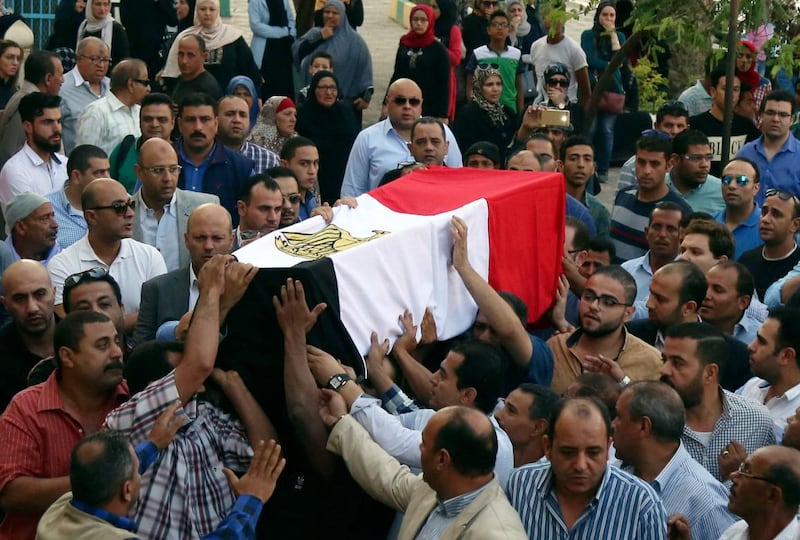Egypt's president Abdel-Fattah El Sisi ordered a massive shake-up of the nation’s defence establishment to focus on Libya which Egypt now considers the gravest threat to its stability.
The changes come less than a week after the bloody confrontation between terrorists and security forces in the western desert just 135 kilometres away from Cairo.In a presidential decree issued on Saturday, President El Sisi named Lieutenant General Mohamed Farid Hegazi as the new army chief-of-staff replacing Mahmoud Ibrahim Hegazi, 61, who had been tasked with leading Egyptian mediation efforts between rival Libyan factions.
Despite the similarities in name, the new and former army chief of staff are not related. However, President El Sisi's son Hassan married the daughter of Mahmoud Ibrahim Hegazi in 2010, when the then General Sisi was head of military intelligence.
“We are at war and no one is above accountability,” said Major General (retired) Mohamed Noureldeine, a former assistant interior minister. “The people who have been replaced are very senior and strongly connected both with the presidency and the minister of the interior, and this change was ordered because the [security] apparatus proved that they did not perform their duties.”
Officials said last week’s operation on the Al Wahat Al Kharga-Assiut highway resulted in the deaths of 16 police.
On Saturday, the government’s Middle East News Agency said 13 terrorists were killed in a raid in the same region on Friday as “revenge for the blood of the men who were martyred last week in the oasis”.
After that clash, Egyptian police said they recovered weapons. suicide bomber belts, and cash from the desert camp.
Security analysts in Cairo have increasingly pointed to the persistence of arms smuggling and unimpeded movement of terrorists into Egypt from Libya, its western neighbour which shares a 1,200-kilometre-long border with Egypt.
During his three-day state visit to Paris last week, Mr El Sisi and French president Emmanuel Macron both emphasized their common interest in fighting against terrorism in Libya, where ISIL and Al Qaeda-linked jihadists continue to operate in rarely patrolled desert areas.
“We have destroyed 1,200 vehicles loaded with arms, ammunition and fighters in the last two and a half years,” Mr El Sisi told France 24.
But the deadly October 20 attack on police on the fringes of Giza governorate occurred despite ongoing Egyptian air raids.
Active supply lines from Libya serve as a bloody reminder that ISIL can stage operations in the western desert as well as North Sinai where hundreds of members of the security forces have been killed alongside civilians since the 2013 ousting of President Mohamed Morsi of the Muslim Brotherhood.
“It is now known that the terrorists are moving from the places of conflict that were in Mosul and Raqqa to Turkey, and from there to Libya with the aim of destabilising Egypt,” said Maj-Gen Noureldeine.
The new army chief of staff, Mohamed Farid Hegazi, holds both a bachelor's and master's degree in military science. He served as chief of staff of the Northern Military Region, led the Second Field Army and commanded the Second Army from July 2010 to July 2012. Later he was secretary-general of the Defence Ministry during one of the most crucial periods of the country's recent history - the June 30 Revolution, which produced the biggest protest ever seen in Egypt and ended with a coup d'etat.
In tandem with Mr El Sisi’s announcement of a military shake-up, interior minister Magdy Abdel-Ghaffar ordered the replacement of General Mahmoud Shaarawy as head of the National Security Agency [NSA], the main domestic intelligence agency.
Mr. Abdel-Ghaffar also reassigned both General Hisham El-Iraqi, the deputy minister for the NSA's Giza sector, and General Ibrahim El-Masry, the director of the NSA in Giza.
Prior to the reshuffle, commentators focused on a lack of co-ordination between Egypt’s police and armed forces as the Al Wahat operation was underway and conceded that ministry of interior forces are not equipped to deal with the kinds of heavy weapons used by the terrorists and which intelligence sources believe originated in Libya.
“Perhaps there was an erroneous assessment on this score,” said Brigadier General Khaled Okasha. “Army intervention is called for under such circumstances.”
The Al Wahat attack is likely to intensify Egyptian military activity on the Libyan border and perhaps on the other side of it.
Army spokesman Tamer el-Rifai said air strikes on the western border were launched shortly after the Al Wahat ambush. Such operations are likely to intensify as Egypt’s top brass moves to limit the threat emanating from Libya.
But David Mack, a Middle East Institute Scholar in Washington, D.C. and former US Ambassador to the UAE urges the newly-appointed military leadership in Egypt to guard against overreach.
“Egyptian leaders are correct to be concerned that developments in Libya have had a negative effect on their internal security,” Mr Mack said. “But cross- border deployment of Egyptian forces lacking a broad, international consensus and mandate for such a move, even if the security situation along the Libyan-Egyptian border deteriorates further, would probably create adverse results for both Libya and for Egyptian security and political interests in the longer term.”





